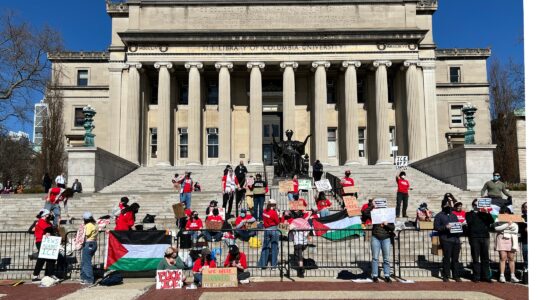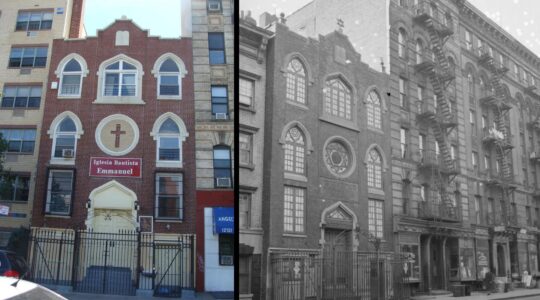Another suit was readied this week in behalf of former Nazi slave laborers living in Israel even as some Jewish leaders expressed concern with the proliferation of Holocaust-related litigation. “It’s becoming a cottage industry,” said Abraham Foxman, national director of the Anti-Defamation League.
“This whole issue of restitution and reparation deals with a question of providing justice to the memory of those who are no longer here, and justice to history and individuals,” he said.
Foxman argued that no one will ever know how many Jewish victims of the Holocaust had bank accounts and insurance policies. Thus, he said, settlements in these cases will only be “symbolic justice, not real justice.”
“I am concerned,” he continued, “that the whole effort should not skew the fact that 6 million Jews died because they were Jews — not because they had bank accounts, art or other property. After they were murdered, they were robbed. I don’t want the last soundbite on the Shoah in this century to be Jews and their money, because that would pervert their deaths.”
Henri Hajdenberg, president of the Representative Council of French Jewish Organizations, the umbrella body of French Jewry, said money is secondary to learning what really happened to French Jewry during the Holocaust.
“It’s not just a question of money,” he said at a recent press conference here organized by the Jewish Community Relations Council of New York. “We don’t want to come back to that one cliche: Jews and money, Jews and gold. We don’t want our fight to be seen as just Jews getting the money. This is about principle, memory and education.”
Hajdenberg said commissions are looking into issues of Jewish property, art, bank accounts and insurance policies. But unlike the Jewish community of Poland, which numbers only about 5,000, he said the 700,000 Jews of France are strong enough to deal with these complex matters without the need for help from outside Jewish groups.
Hajdenberg also drew a distinction between the problem in Switzerland — which he said was largely confined to the banks — and that in France, whose collaborationist Vichy government cooperated with the Nazis in deporting Jews to their deaths.
He said that because of world attention on what the Swiss government did to Jews during the war, Swiss “public opinion is now not with the Jews. … We in France are preoccupied with issues of restitution, but we have to be cautious about public opinion in France. We can’t just ask for money” but rather have to present a convincing argument.
A Swiss government panel reported earlier this month that latent anti-Semitism has come into the open since the Swiss gold controversy erupted. It estimated that 10 percent of the population holds anti-Semitic views and that more could be influenced by propaganda.
The new suit involving slave laborers who now live in Israel is to be filed by Manhattan lawyer Edward Fagan, who has previously filed other suits in behalf of other Jewish slave laborers. Fagan justified the suits, saying the companies that used these slave laborers profited from them and worked most of them to death. He estimated that there were as many as 3 million Jewish slave laborers.Hajdenberg said a special French government commission has been established to learn what happened to money Jews had on deposit in French banks in 1941, the year the Nazis froze all Jewish accounts. In late 1941, Hajdenberg said, the Nazis gave French Jews one week to pay a “penalty” of 1 billion francs.
"The Jews couldn’t pay it, so French banks paid and the Jews were to give back the money later,” he said. “But the French government directed that half of all Jewish cash assets [in French banks] in excess of 1,000 francs be transferred to the state bank. That was done.”
Bank records disappeared after the war but now more than 20,000 files have been located that include the penalty each Jew paid, Hajdenberg said. Also included is a list of the money taken from each Jew who was arrested by French police and taken to the Drancy camp run by the occupying Nazis. From Drancy, the Jews were deported to Nazi death camps, where most of them were murdered in gas chambers. Their money was placed in the state bank.
Hajdenberg said the commission combing those records is expected to issue a report by the end of the year. He added that the state bank records also revealed precisely how much money was taken from each Jews’ private bank account for deposit in the state bank. And it tells in which banks the Jews had money.
“The commission’s report will tell us if there was restitution or not because after the war, the state bank had to [return] the money.”
It is believed, Hajdenberg said, that those Jews who survived the war by hiding, did get their money back if they went to the bank and asked for it. But he said the state bank and the private banks apparently retained the money of those Jews who did not survive and who had no heirs to request it. A 1966 French law, reinforced in 1977, had ordered the banks to turn over to the state all Holocaust-era dormant deposits.
It is known that some 76,000 Jews — one-fourth of those in France — were deported to camps during the Nazi occupation from 1940 to 1944 and that only about 2,000 survived. Hajdenberg surmised that perhaps 15,000 families were wiped out. “Legally, Jewish institutions can’t ask to get back the money [dormant accounts] from the state bank, private banks or the state,” said Hajdenberg. “But morally we can ask for reparations collectively for the Jews who disappeared.”
Asked how much money may be in those dormant accounts, Hajdenberg pointed out that most of the deported Jews were poor. “So we’re not speaking about billions and billions, we’re speaking about principle,” he said.
The French newspaper LeMonde reported last year that experts estimate the amount to be $135 million in today’s valuation. It said its investigation found that bureaucracy and confusion, rather than any specific policy, was to blame for French banks keeping money of Jewish Holocaust victims.
The New York Jewish Week brings you the stories behind the headlines, keeping you connected to Jewish life in New York. Help sustain the reporting you trust by donating today.




